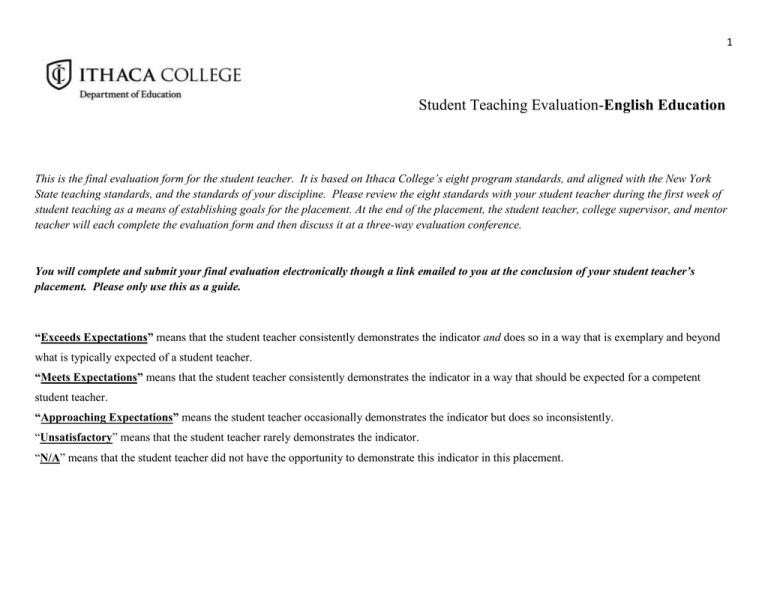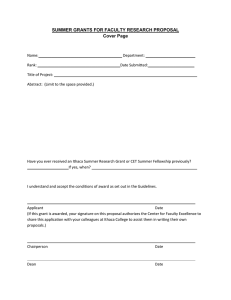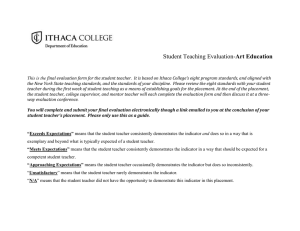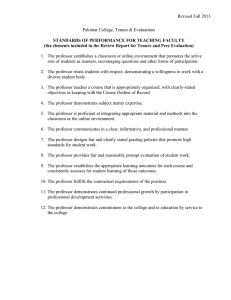Download English Eval Form
advertisement

1 Student Teaching Evaluation-English Education This is the final evaluation form for the student teacher. It is based on Ithaca College’s eight program standards, and aligned with the New York State teaching standards, and the standards of your discipline. Please review the eight standards with your student teacher during the first week of student teaching as a means of establishing goals for the placement. At the end of the placement, the student teacher, college supervisor, and mentor teacher will each complete the evaluation form and then discuss it at a three-way evaluation conference. You will complete and submit your final evaluation electronically though a link emailed to you at the conclusion of your student teacher’s placement. Please only use this as a guide. “Exceeds Expectations” means that the student teacher consistently demonstrates the indicator and does so in a way that is exemplary and beyond what is typically expected of a student teacher. “Meets Expectations” means that the student teacher consistently demonstrates the indicator in a way that should be expected for a competent student teacher. “Approaching Expectations” means the student teacher occasionally demonstrates the indicator but does so inconsistently. “Unsatisfactory” means that the student teacher rarely demonstrates the indicator. “N/A” means that the student teacher did not have the opportunity to demonstrate this indicator in this placement. III.6 V.0 4.3 2.6 II.2 II.2 2.5 II.5 NCTE Standards 2003 NY State Teaching Standards (by element) N/A I.2 II.1 N/A 3.7 2.5 Unsatisfactory III.1 VI.2 Unsatisfactory II.1 Approaching Expectations 3.1 Approaching Expectations I.1 Standard 1. Content Knowledge: This Ithaca College teaching professional demonstrates a rich, thorough understanding of the content and skill knowledge, theories, and issues that comprise the discipline. Meets Expectations NY State Teaching Standards (by element) Meets Expectations NCTE Standards 2003 Exceeds Expectations NCTE Standards 2012 Exceeds Expectations 2 Identifies the key concepts, knowledge, and skills for each unit of instruction Demonstrates a thorough, thoughtful understanding of English language and literature theories and concepts Applies knowledge of current research in teaching and learning English for adolescents Makes connections across various language and literature topics, and cultural products, practices, and perspectives both specific to and in addition to those constituting the students’ funds of knowledge Attempts to make meaningful connections with other disciplines as appropriate Demonstrates knowledge of and enthusiasm for English language and literature and seeks to engage and motivate students to participate in their own learning Examines literature and language in the context of real-world situations beyond the walls of the classroom and areas of students' personal interests; and Overall I would rate this Ithaca College teacher professional’s performance on Standard 1- Content Knowledge as: Comments: NCTE Standards 2012 V.2 3.1 V.1 III.1 III.2 I.3 II.4 3.3 III.3 Standard 2. Planning and Instruction/Implementation: This Ithaca College teaching professional is able to plan and implement effective, developmentally appropriate lessons and curricula based upon sound principles of content knowledge and skill development. Completes a set of thoughtfully-developed lesson plans for the following week in time for advance review by the mentor teacher Maintains a well-organized notebook of instructional plans, handouts, &assessments Communicates clearly, accurately, and effectively with students Uses knowledge of students’ strengths, needs, development, and prior knowledge in planning Selects instructional goals and objectives based on local, state, and/or national standards and contextualized by community and student linguistic and cultural backgrounds Designs and implements lessons that are coherent, well organized, and carefully paced and include appropriate introductions, transitions, and closures. Designs and implements lessons that are challenging and meaningful, and are 3 III.2 2.4 II.3; III.4 III.1 IV.1 3.3 3.4 I.2 III.5 III.2 3.2 III.5 III.2 IV.4 I.2 3.2 4.6 4.8 I.6 I.6 II.3 III.3 4.9 I.2 III.5 IV.3 VI.1 V.2 3.1 I.4 V.2 3.1 III.3 III.6 IV.1 V.4 4.2 3.6 I.3 III.5 II.6 Comments: accessible and motivating to all students Uses a wide variety of instructional models and methods for assisting students in developing: habits of interpretive, critical and evaluative thinking; the skills and usage of reading processes; the skills and usages of composing processes and genres, including analysis of audience and purpose; the skills of listening, speaking and presenting, including analysis of audience and purpose; the skills of visual literacies; the skills of media and communications literacies; and the ability to make meaning of texts through personal response and a variety of media environments. Cultivates in students the skills and usage of a wide variety of reading comprehension strategies for use with print and non-print texts Plans instruction that incorporates knowledge of language structure, history and conventions to facilitate students’ comprehension and interpretation of print and non print texts. Designs instruction in the strategic use of language conventions (grammar, usage, and mechanics) in the context of students’ writing for different audiences, purposes, and modalities. Integrates English language arts and literacy instruction that promotes social justice and critical engagement with complex issues related to maintaining a diverse, inclusive, equitable society. Acquires knowledge of individual students from students, families, guardians, and/or caregivers in order to plan for student learning. Allows sufficient wait-time after asking questions; responds appropriately to needs Seeks out information about their students’ needs and multiple ways of learning in order to adapt instruction accordingly. Adjusts/adapts instruction mid-lesson, based on observed assessment of learning Anticipates possible student misunderstandings and/or alternate ways of thinking Plans lessons that help students develop collaboration and communication skills Demonstrates knowledge of content/information literacy and students’ technological literacies and applies these in planning appropriate instruction and assessment Overall I would rate this Ithaca College teacher professional’s performance on Standard 2- Planning & Instruction/Implementations as: IV.1 Establishes a classroom atmosphere in which students feel comfortable making contributions and sharing their language and cultural abilities Develops and implements relevant, research-based instruction that engages, excites, and intellectually challenges learners Gives students feedback that encourages and affirms students’ progress Demonstrates knowledge of child and adolescent development, especially as it relates to adolescents as readers Demonstrates knowledge of child and adolescent development, especially as it relates to adolescents as learners and users of language Provides clear directions for activities and assignments Plans for efficient transitions between activities or portions of the lesson Establishes and adheres to clear classroom rules, expectations, and procedures Responds efficiently and effectively to classroom management problems when they do occur Knows students’ names, backgrounds, interests, and strengths; makes instructional connections with learners and their interests Establishes and maintains firm expectations of appropriate, respectful language to promote social justice and language awareness inside and outside the classroom Arranges a physical classroom environment that is safe and conducive to learning Uses physical resources (blackboards, bulletin boards, displays, technology, etc.) to support learning Demonstrates flexibility and responsiveness Overall I would rate this Ithaca College teacher professional’s performance on Standard 3- Positive Learning Environment as: 4.4 V.0 III.1; IV.2 IV.2 I.0 III.6 I.1 II.0 IV.3 IV.4 IV.3 IV.3 V.2 VI.1 4.5 IV.1 IV.4 2.1 Comments: N/A V.2 Unsatisfactory Standard 3. Positive Learning Environment: This Ithaca College teaching professional creates safe and motivational learning environments that encourage all students to become actively involved. Approaching Expectations NY State Teaching Standards (by element) Meets Expectations NCTE NCTE Standards Standards 2012 2003 Exceeds Expectations 4 I.2 VI.0 VI.2 N/A 3.1 N/A II.4 I.5 I.3 Unsatisfactory 2.1 4.4 2.2 Establishes a classroom atmosphere of high expectations and worthwhile opportunities for all Attempts to differentiate instruction to meet the needs of all students Demonstrates cultural sensitivity and culturally-responsive pedagogy Builds on the students’ diverse experiences and perspectives to enrich instruction Accommodates students with identified special needs Provides support for English language learners; draws on home and community languages to build students’ skills; demonstrates knowledge of language acquisition theories and processes Demonstrates knowledge of how theories and research about social justice, diversity, equity, student identities, and schools as institutions can affect student learning in English Language Arts. Plans theory and research-based instruction responsive to students’ local, national and international histories, individual identities (e.g., race, ethnicity, gender expression, age, appearance, ability, spiritual belief, sexual orientation, socioeconomic status, and community environment), and languages/dialects as they affect students’ opportunities to learn in ELA. Overall I would rate this Ithaca College teacher professional’s performance on Standard 4- Diversity as: Unsatisfactory III.3 Approaching Expectations 2.1 Approaching Expectations Standard 4. Diversity: This Ithaca College teaching professional respects and possesses knowledge of diversity in its many forms and knows how to use this competence to develop relationships, instruction, schools, classrooms, communities and experiences that help all students achieve to their fullest potential and function effectively and respectfully in a diverse world. Meets Expectations NY State Teaching Standards (by element) Meets Expectations V.3 V.2 V.2 V.3 IV.4 NCTE Standards 2003 Exceeds Expectations NCTE Standards 2012 Exceeds Expectations 5 Comments: NCTE NCTE Standards Standards 2012 2003 NY State Teaching Standards (by element) Standard 5. Technology: This Ithaca College teaching professional is able to effectively utilize technology to enhance student learning and professional growth and development. V.4 IV.1 III.5 II.3 Uses technology appropriately to enhance language, literacies and cultural learning Uses technology appropriately to support effective language, literacies and cultural teaching Utilizes technology to maintain accurate records Uses technology to enhance knowledge and professional development Demonstrates knowledge of technological literacy; and its effect on student learning in composition II.1 V.4 II.3 3.6 3.6 3.6 4.6 VII.4 I.6 6 I.2 and its effect on student learning in reading Overall I would rate this Ithaca College teacher professional’s performance on Standard 5- Technology as: 4.10 V.5 III.4 3.1 V.2 V.0 4.10 V.2 NCTE Standards 2012 NCTE Standards 2003 NY State Teaching Standards (by element) Standard 7. Collaboration and Outreach: This Ithaca College teaching professional fosters positive relationships with a variety of target groups (students, families, colleagues, local community members, etc.) in order to promote and enhance the teaching and learning environment. VII.0 VII.0 2.3 VI.2 Establishes a positive relationship with students Establishes a positive relationship and collaborates effectively with mentor teacher V.3 N/A V.3 N/A 4.10 Unsatisfactory V.1 V.1 Unsatisfactory 4.10 4.10 Approaching Expectations III.2 III.2 IV.2 IV.2 Approaching Expectations 3.2 Meets Expectations III.2 NY State Teaching Standards (by element) V.2 V.4 Meets Expectations NCTE Standards 2003 Exceeds Expectations Standard 6. Assessment: This Ithaca College teaching professional demonstrates the ability to develop and utilize a variety of assessment tools and techniques designed to evaluate student learning and performance, provide feedback, and shape future lesson planning, programs, and curricula. NCTE Standards 2012 Exceeds Expectations Comments: Aligns assessments to objectives to instruction and tasks to performance guidelines Uses assessment to enhance students’ development of interpretive, critical and evaluative skills and knowledge in reading, writing, listening, speaking, viewing and presenting Plans for both formative and summative integrated assessment Plans for both formal and informal integrated assessment Plans assessments of writing that promote students’ development as writers Provides specific, timely, and meaningful feedback to students to engage and cultivate them as writers Communicates with students in ways that actively involve them in their own learning of ELA Provides information to help students understand the format of assessments and the criteria by which they will be evaluated Uses data and knowledge of student skills and understanding to develop curriculum and plan instruction Uses assessment information to self-reflect on teaching effectiveness Overall I would rate this Ithaca College teacher professional’s performance on Standard 6- Assessment as: Comments: 7 VII.0 2.3 VI.2 VII.0 2.3 VI.2 VII.2 VII.1 VI.4 VI.1 VII.1 VI.5 VII.2 VI.4 VII.0 Establishes a positive relationship and collaborates effectively with department/team members Establishes a positive relationship and collaborates effectively with college faculty/supervisors Attends department, team, school, and district meetings Upholds professional standards of practice and policy as related to students’ rights and teachers’ responsibilities. Understands and complies with relevant laws and policies as related to students’ rights and teachers’ responsibilities Participates fully in the life of the school; attends and assists with school activities and events Communicates and collaborates with students’ families appropriately Overall I would rate this Ithaca College teacher professional’s performance on Standard 7- Collaboration and Outreach as: 4.10 VI.3 NCTE Standards 2003 NY State Teaching Standards (by element) Standard 8. Professional Development: This Ithaca College teaching professional engages in reflective practice and continually seeks to improve his/her knowledge base and effectiveness as a teacher, make positive contributions to the culture of his/her field, and demonstrate the dispositions of an emerging professional. VII.3 Actively seeks feedback on and suggestions for teaching effectiveness Responds openly and positively to feedback and suggestions Demonstrates the ability to self-reflect and analyze teaching effectiveness Completes thoughtful, well-written weekly reflections, as required Participates in professional organizations and uses their resources Participates in school, district, state, and/or national professional development activities Continues to develop and deepen knowledge of research in content area(s) and in pedagogy Demonstrates professionalism (see IC’s list of professional dispositions and behaviors) Overall I would rate this Ithaca College teacher professional’s performance on Standard 8- Professional Development as: VII.2 VII.2 VII.2 VII.2 2.3 2.3 2.3 VII.1 3.7 VII.4 Comments: VII.3 VII.2 N/A Unsatisfactory Approaching Expectations Meets Expectations NCTE Standards 2012 Exceeds Expectations Comments:


